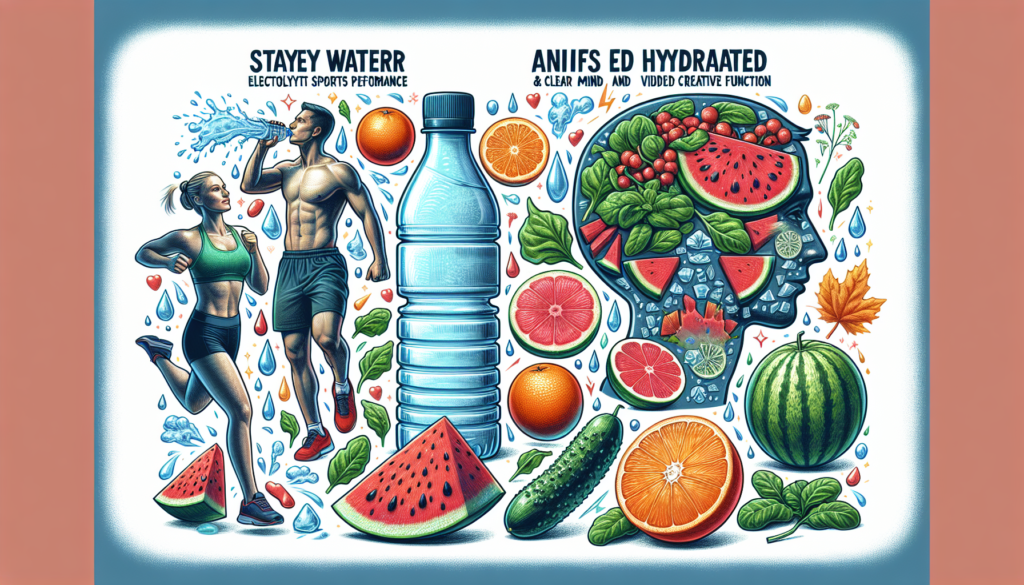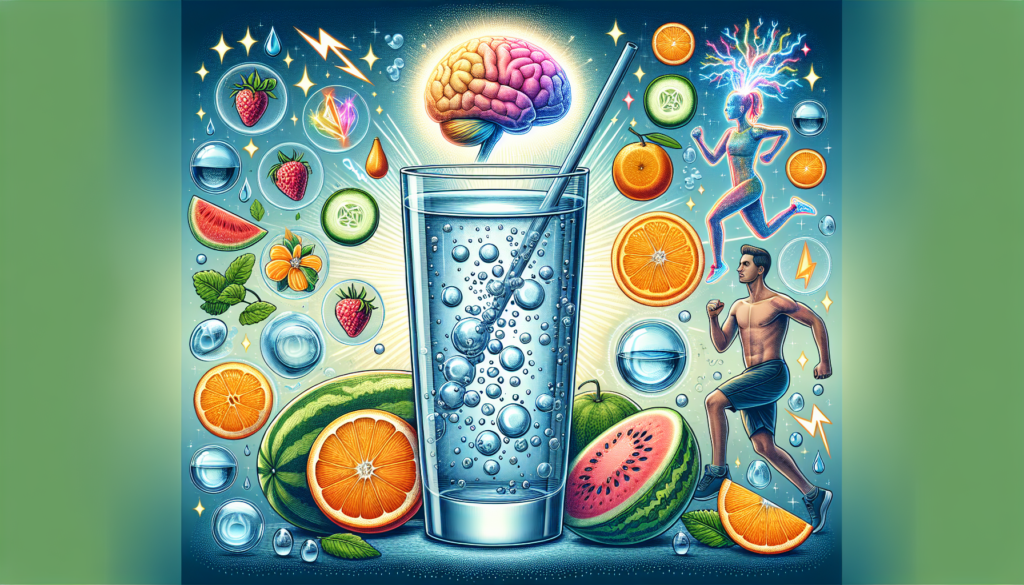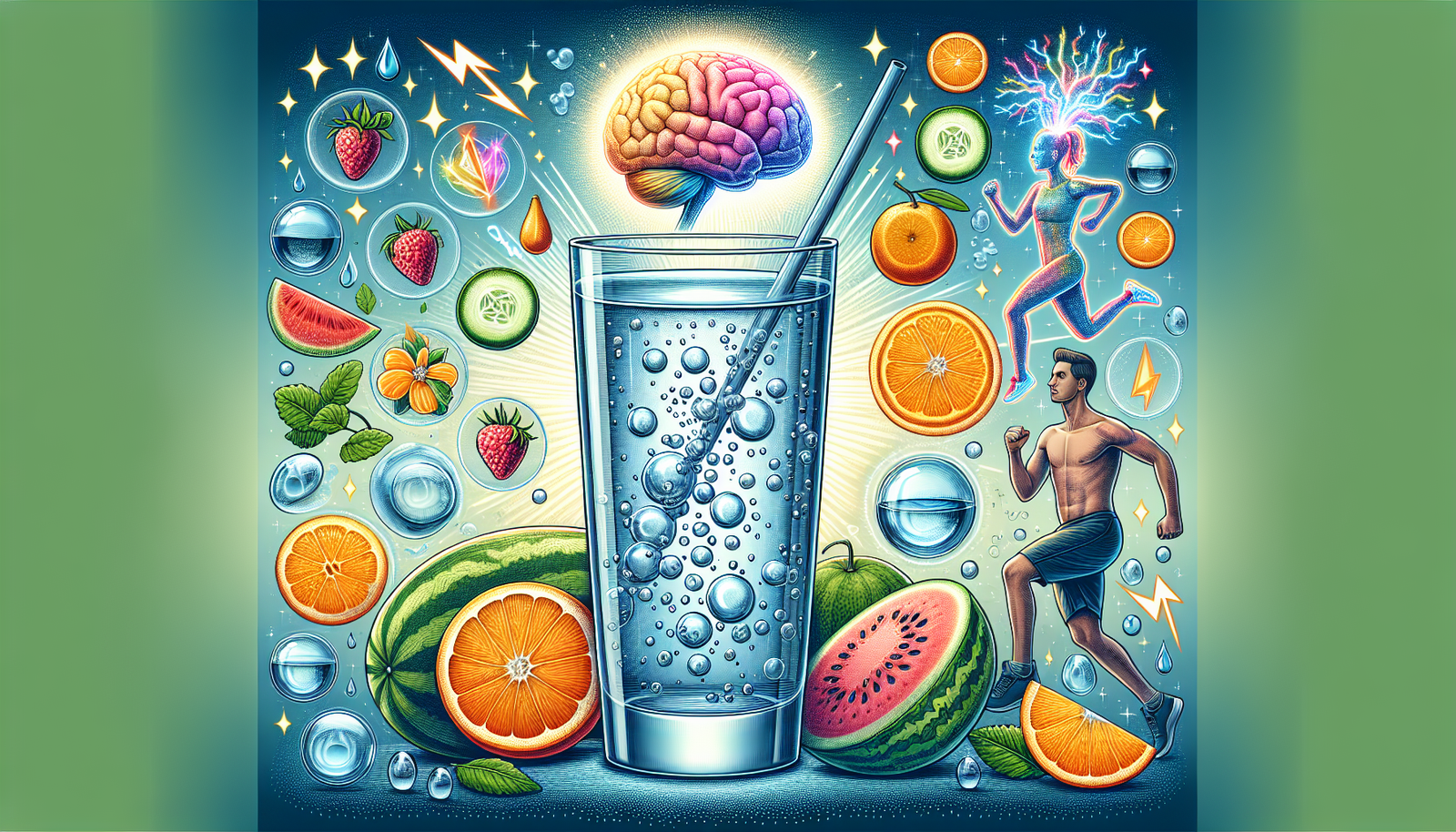In a world where hydration is often associated solely with guzzling down glasses of water, it’s essential to broaden our perspectives and recognize that staying hydrated goes beyond just H2O. This article aims to shed light on the various ways you can keep your body hydrated throughout the day, whether it’s through the consumption of hydrating foods, herbal teas, or even incorporating electrolyte-rich beverages into your routine. Discover the numerous options available to quench your thirst and nourish your body in unexpected ways.
The importance of staying hydrated
Staying hydrated is essential for maintaining good health and overall well-being. Water plays a vital role in the body, and its benefits are far-reaching. From supporting bodily functions to improving cognitive function, proper hydration is crucial. Dehydration, on the other hand, can have detrimental effects on various aspects of your health. Understanding the role of water in the body, the benefits of proper hydration, and how dehydration affects overall health is key to maintaining optimal hydration levels.
Understanding the role of water in the body
Water is the main component of our bodies, making up about 60% of our total body weight. It plays a crucial role in almost every bodily function. Water helps transport nutrients, maintain body temperature, lubricate joints, and flush waste products from the body. It also aids in digestion, supports the immune system, and regulates blood pressure.
The benefits of proper hydration
Proper hydration offers numerous benefits for your body and mind. When you are well-hydrated, you may experience improved concentration, enhanced cognitive function, and increased alertness. Water also helps regulate body temperature, which is especially important during physical activity or in hot weather. Additionally, staying hydrated can promote healthy skin, improve digestion, and support weight management.
How dehydration affects overall health
Dehydration occurs when the body is losing more fluids than it’s taking in. Even mild or moderate dehydration can have significant impacts on your overall health. It can lead to symptoms like fatigue, dizziness, headaches, and dry skin. Over time, chronic dehydration can contribute to digestive problems, kidney issues, and even cardiovascular problems. Therefore, it is crucial to recognize the signs of dehydration and take necessary steps to prevent it.
Hydration beyond water
While water is the best choice for staying hydrated, there are other fluids that can contribute to your hydration levels. Beverages like herbal tea, fruit juices, and milk contain water and can provide hydration. However, be cautious with sugary drinks and limit their consumption. Additionally, foods with high water content, such as fruits and vegetables, can also contribute to your overall hydration.
The role of electrolytes
Electrolytes play a crucial role in maintaining proper hydration. They are minerals that help balance the fluids in your body and regulate nerve and muscle function. The most common electrolytes include sodium, potassium, calcium, and magnesium. When you sweat or lose fluids, you also lose electrolytes. Therefore, it’s important to replenish them, especially during intense physical activity or in hot climates.
Hydrating foods to include in your diet
Incorporating hydrating foods into your diet can complement your fluid intake. Fruits like watermelon, strawberries, and oranges have high water content and can help keep you hydrated. Vegetables like cucumbers, lettuce, and celery are also excellent choices. Soups and broths can be hydrating options as well, particularly for individuals who struggle with drinking plain water.

Factors influencing hydration needs
Several factors can influence your hydration needs. Physical activity and exercise increase the amount of fluid your body loses through sweat, therefore requiring you to drink more to stay properly hydrated. Climate and environmental conditions, such as high temperatures or humidity, can also increase your fluid requirements. Furthermore, individual differences in body size, metabolism, and medical conditions can affect how much water you need to drink.
Physical activity and exercise
When engaging in physical activity or exercise, it’s crucial to pay attention to your hydration levels. As you sweat during workouts, your body loses water and electrolytes, which need to be replenished. Before exercise, it’s important to drink fluids to ensure you start hydrated. During exercise, aim to drink water or sports drinks regularly to maintain proper fluid balance. After your workout, continue to drink fluids to replace what you’ve lost and support recovery.
Climate and environmental conditions
Hot weather and humid environments can pose additional challenges for staying hydrated. When exposed to high temperatures, your body sweats more to regulate body temperature. As a result, you may need to increase your fluid intake to prevent dehydration. It’s important to drink fluids before, during, and after outdoor activities in hot climates to maintain proper hydration levels.
Individual differences in hydration requirements
Every individual is unique, and the amount of water required for optimal hydration can vary. Factors such as body weight, age, gender, and overall health can influence your hydration needs. Pregnant and breastfeeding women, for example, may require increased fluid intake to support their own health and that of their baby. It’s important to pay attention to your body’s signals and adjust your fluid intake accordingly.
Signs and symptoms of dehydration
Recognizing the signs of dehydration is critical for maintaining proper hydration levels. Early signs of dehydration include feeling thirsty, having a dry mouth, and dark-colored urine. These symptoms indicate that your body needs more fluids. As dehydration worsens, you may experience fatigue, dizziness, rapid heartbeat, and decreased urine output. Severe dehydration can be life-threatening and requires immediate medical attention.
The impact of dehydration on physical performance
Dehydration can significantly impair physical performance, especially during intense exercise or prolonged activity. As your body loses water and electrolytes through sweat, it becomes more difficult to cool down and regulate body temperature. This can lead to decreased endurance, muscle cramps, and increased fatigue. Staying properly hydrated before, during, and after exercise can help maintain optimal physical performance.
Recognizing severe dehydration and its consequences
Severe dehydration is a medical emergency that requires immediate attention. In addition to the symptoms mentioned earlier, severe dehydration may cause confusion, rapid breathing or heartbeat, sunken eyes, and fainting. It can lead to complications such as heat exhaustion or heatstroke. If you or someone else shows signs of severe dehydration, seek medical assistance immediately.

Hydration guidelines for optimal health
To maintain optimal hydration and promote good health, it’s important to follow daily water intake recommendations. While the “8 cups a day” rule is a common guideline, individual needs can vary. A general recommendation is to drink at least 8 cups (64 ounces) of water daily. However, factors like physical activity, climate, and individual differences may require adjustments to this guideline.
Tips for increasing water consumption
If you struggle to drink enough water, there are several tips that can help you increase your water consumption. Carry a reusable water bottle with you throughout the day to remind yourself to drink. Set reminders on your phone or use hydration tracking apps to stay accountable. Infuse your water with slices of fruits or herbs to add flavor and make it more enjoyable. Remember to drink water before, during, and after meals, as well as during physical activity.
Balancing hydration with other beverage choices
While water should be the main source of hydration, it’s natural to enjoy other beverages as well. However, it’s important to be mindful of your choices. Avoid sugary drinks like soda and energy drinks, as they can contribute to weight gain and provide little hydration. Caffeinated beverages like coffee and tea can still contribute to your overall fluid intake, but they may have a diuretic effect, meaning they can increase fluid loss. If you consume caffeinated beverages, be sure to balance them with water intake.
Managing hydration during physical activity
Proper hydration during physical activity is crucial to support performance and prevent dehydration. Before engaging in exercise or sports, it’s essential to hydrate adequately. Drink water or sports drinks about 2 to 3 hours before physical activity. During exercise, aim to drink fluids every 15-20 minutes, especially if engaging in intense or prolonged activities. After your workout, it’s important to replenish fluids to support recovery.
Pre-activity hydration strategies
To ensure you start your physical activity properly hydrated, consider these pre-activity hydration strategies. Drink approximately 16 to 20 fluid ounces of water or a sports drink 2 to 3 hours before exercise. If you’re short on time, consume 8 to 10 fluid ounces of water or a sports drink 10 to 20 minutes before exercise. Additionally, avoid excessive alcohol consumption, as it can dehydrate your body.
Hydration during exercise and sports
During exercise and sports, it’s important to maintain proper hydration to support performance and prevent dehydration. The best method is to drink fluids regularly, taking small sips every 15-20 minutes. Water is usually sufficient for activities lasting less than an hour. For longer or more intense activities, sports drinks that contain electrolytes can help replenish what you lose through sweat.
Replenishing fluids post-workout
After physical activity, it’s crucial to replenish fluids to aid in recovery. Drink plenty of water within 2 hours of finishing your workout. Aim for at least 16-24 fluid ounces or more, depending on the duration and intensity of your exercise. If you were engaged in intense or prolonged activity, consider consuming a sports drink or a snack that combines carbohydrates and electrolytes to replenish depleted glycogen and electrolyte levels.
Hydration and specific populations
Different populations have unique hydration needs that should be considered for optimal health.
Hydration considerations for children and adolescents
Children and adolescents have higher water requirements due to their rapid growth and higher activity levels. It’s important to encourage them to drink water regularly and limit sugary beverages. Keep in mind that children may need reminders to stay hydrated, especially during hot weather or physical activities.
Maintaining hydration in older adults
As we age, our sense of thirst may diminish, making it harder to recognize when we’re dehydrated. Older adults are also more susceptible to dehydration due to changes in the body’s water balance. It’s essential for older adults to drink water regularly and pay attention to signs of dehydration, even if they don’t feel thirsty.
Hydration for pregnant and breastfeeding women
Pregnant and breastfeeding women have increased fluid requirements to support the baby’s growth and milk production. They should aim to drink more water and fluids throughout the day. It’s important for pregnant and breastfeeding women to consult their healthcare provider to determine the optimal amount of fluid intake for their specific needs.
Common misconceptions about hydration
There are several common misconceptions about hydration that need to be addressed to ensure proper understanding.
The myth of 8 cups a day
The notion that everyone needs to drink eight cups (64 ounces) of water per day is a common misconception. While it can serve as a guideline, individual water needs vary based on several factors, including body weight and activity levels. It’s important to listen to your body’s signals of thirst and adjust your fluid intake accordingly.
The truth about caffeinated beverages and hydration
Contrary to popular belief, consuming caffeinated beverages like coffee and tea does not lead to dehydration. While caffeine can act as a mild diuretic, the fluid content in these beverages more than compensates for any potential diuretic effects. However, it’s still important to balance caffeinated beverages with water intake for optimal hydration.
Dispelling misconceptions about thirst as an indicator
Relying solely on thirst as an indicator of hydration can be misleading. The sensation of thirst lags behind the body’s actual need for water, meaning you may already be dehydrated by the time you feel thirsty. To prevent dehydration, it’s recommended to drink water regularly throughout the day, even if you don’t feel thirsty.
Hydration tips for busy individuals
For busy individuals, staying hydrated can sometimes be a challenge. However, there are strategies that can help incorporate hydration into your daily routine.
Strategies for staying hydrated on-the-go
Carrying a refillable water bottle with you wherever you go can serve as a constant reminder to drink water. Set reminders on your phone or use hydration tracking apps to stay accountable and track your water intake. If you find it difficult to drink plain water, try infusing it with fruits or herbs to add flavor and make it more enjoyable.
Incorporating hydration into work routines
In a busy work environment, it’s important to prioritize hydration. Keep a water bottle at your desk and make a habit of drinking water throughout the day. Take regular breaks to refill your water bottle and stretch your legs. If permitted, consider keeping a water bottle nearby during meetings or conferences.
Smart hydration choices when dining out
When dining out, be mindful of your beverage choices to support hydration. Opt for water as your main drink and limit sugary beverages. If you prefer flavored options, consider unsweetened herbal tea or sparkling water. Additionally, be cautious of alcoholic beverages, as they can contribute to dehydration. Drink water alongside your meal to balance fluid intake.
Dehydration prevention and awareness
Preventing dehydration and raising awareness about the importance of hydration is crucial for maintaining good health. Here are some considerations to promote healthy hydration habits.
Educating others on the importance of hydration
Share information about the importance of hydration with friends, family, and colleagues. Discuss the benefits of staying properly hydrated and dispel common misconceptions. Encourage others to prioritize hydration and provide practical tips for incorporating water into their daily routine.
Recognizing signs of dehydration in others
Observe the people around you and look out for signs of dehydration. Notice if someone is frequently feeling thirsty, experiencing headaches, or exhibiting signs of fatigue. Offer them encouragement to drink water and remind them of the importance of hydration.
Promoting healthy hydration habits in communities
Get involved in community initiatives that promote healthy hydration habits. Support local schools in promoting water consumption among students by installing water fountains and organizing educational programs. Collaborate with local health organizations to host workshops or events that raise awareness about the benefits of proper hydration.
In conclusion, staying properly hydrated is essential for your overall health and well-being. Water plays a crucial role in the body, supporting various bodily functions and promoting optimal performance. Dehydration can have detrimental effects on your physical and cognitive abilities, as well as your long-term health. By understanding the role of water in the body, recognizing the signs of dehydration, and following proper hydration guidelines, you can maintain optimal hydration levels and lead a healthier life. Remember, water is not the only source of hydration, and incorporating hydrating foods and other fluids into your diet can complement your water intake. Stay mindful of your hydration needs, prioritize drinking water regularly, and spread awareness about the importance of staying properly hydrated in your community.

